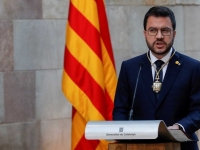Politics
Catalonia suspend relations with Spain for the alleged espionage of its leaders
Revealed by The New Yorker
USPA NEWS -
The regional government of Catalonia suspend its relations with the Government of Spain until it clarifies the involvement of the Government in the espionage of Catalan separatist leaders, revealed by The New Yorker magazine. According to the magazine, Catalan separatist leaders were spied on through the Israeli program Pegasus. This software, which is only sold to national governments, takes advantage of vulnerabilities in mobile phones and applications such as WhatsApp to spy on politicians, journalists, lawyers and economists, but also on citizens with no social relevance.
“Normal political relations with the State cannot be restored until a minimum level of confidence is restored,” the president of the regional government of Catalonia, Pere Aragonès, said on Tuesday. The Catalan leader demanded that the President of the Spanish Government, Pedro Sánchez, explain whether he was aware of or promoted the eavesdropping revealed by the CitizenLab cybersecurity platform through The New Yorker magazine.
However, the Catalan leader refused to break his relations with the Government of Spain, as demanded by his predecessor in office, Carles Puigdemont, who is one of the politicians allegedly spied on. “We will never give up the negotiation process, but the one who must now demonstrate its commitment to the negotiation is the Government. This way it is very difficult to advance,” said the current president of the regional government of Catalonia. Pere Aragonès called for an upcoming meeting with Pedro Sánchez to discuss the issue.
Proudly spied on pro-independence leaders, such as Carles Puigdemont or the former president of the Esquerra Republicana de Catalunya (ERC in its acronym in Catalan), Oriol Junqueras, announced this Tuesday in Brussels the filing of criminal lawsuits in Spain, France, Switzerland, Luxembourg and Germany. They denounced a massive cyberespionage between the years 2019 and 2020 through the Pegasus program. According to a report by The New Yorker magazine, dozens of Catalan politicians from the ERC, Junts per Catalunya and the CUP, as well as members of the Catalan National Assembly and Òmnium Cultural, lawyers and relatives would have suffered the scrupulous monitoring of this invasive software. The president of the regional government of Catalonia, Pere Aragonès, is one of the 63 names included in the list, which also includes Catalan MEPs Diana Riba, Antoni Comí and Jordi Solé. The investigation reveals that Carles Puigdemont and Oriol Junqueras were watched indirectly through relatives such as their wives or lawyers. All Catalan presidents from 2010 onwards would have been victims of cyber espionage.
The Spanish Government, through its spokesperson, Minister Isabel Rodríguez, denied being involved in the espionage, although it refused to reveal whether the National Intelligence Center (CNI in its acronym in Spanish) is involved, relying on the Security Law National. According to the CitizenLab investigation, the CNI has been a client of the Israeli group NSO, manufacturer of Pegasus, “since at least 2015.” The Minister of Defense, Margarita Robles, asked this Tuesday to appear in Parliament at her own request to explain what her department knows about espionage.
The European Parliament investigates
On Tuesday, European Parliament’s new inquiry committee investigating the use of Pegasus and other spyware had its first meeting, electing a Chair and three Vice-Chairs. The new committee is tasked with investigating the use of Pegasus software and other equivalent spyware, and held its constitutive meeting on 19 April. Newly-elected committee chair Jeroen Lenaers (EPP, Netherland) said: “We have seen many cases where innocent people such as journalists and lawyers have been targeted by spyware, and this is a huge problem for democracy and the rule of law. We will now gather information about the use of Pegasus and other equivalent software, and channel these findings into useful recommendations.”
Following the alleged use of the Pegasus surveillance spyware against journalists, politicians, law enforcement officials, diplomats, lawyers, business people, civil society actors and other citizens, the European Parliament decided in March to establish a new committee of inquiry to investigate the use of Pegasus and other surveillance spyware, and whether this use has breached EU law and fundamental rights. The Committee is scheduled to submit a final report after 12 months.
Liability for this article lies with the author, who also holds the copyright. Editorial content from USPA may be quoted on other websites as long as the quote comprises no more than 5% of the entire text, is marked as such and the source is named (via hyperlink).






